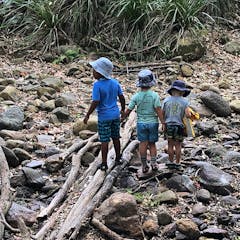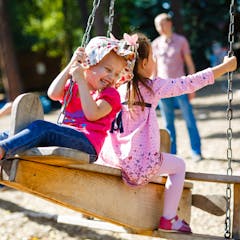
Articles on Play-based learning
Displaying 1 - 20 of 21 articles

We need to ensure the best scientific research in play-based learning and early reading is leveraged, and teachers receive supports to meet children’s developmental and academic needs.

A unique dataset from 32 children on 36 different play dates provided the opportunity to study how young children develop peer relationships, and how consistent they are with different children.

A study following Ontario students between 2004 and 2012 can help policymakers ensure all students get the supports they need when they need them.

Sand is an excellent material to play with. It is versatile, widely available, open-ended and cheap. And you don’t need a fancy plastic mould to make something special.

How to make a ‘fortune teller’ or ‘chatterbox’ with children, and why the paper activity targets many developmental domains at once.

People, policies, practice and place all matter in publicly funded, school-based children’s early learning programs.

The lack of a fully interactive environment in kindergarten due to pandemic school closures may negatively impact some children’s learning in later grades.

The two biggest states have jointly committed to a huge investment in early childhood education and learning over the next decade. But delivering high-quality universal preschool access won’t be easy.

New research demonstrates the many aspects of nature play that make it a great way for young children to gain STEM knowledge.

Talking to a puppet, as opposed to a person, makes the conversation feel less personal. It’s sometimes used in therapy to help the child feel less self-conscious and open up.

P.L.A.Y.: An acronym to remind you why letting children play is a responsible and critical way to support children’s development through the COVID-19 pandemic.

Your children can have a rich experience, seeing different parts of the world and understanding other cultures. And there are several things you can do to support their learning.

One-quarter of children who start school aren’t developmentally ready. Play-based learning in the early years of school can help with the transition, as well as providing a host of other benefits.

Children need to play and discover the world for themselves without too much restriction. Here are some ways we can enhance children’s opportunities to do this.

Being outside helps kids learn. Here are some ways to get them to spend more time in nature.

Children aged three to five don’t need to do formal academic assignments in early childhood education to hit their milestones.

Research shows play-based learning programs enhance children’s learning outcomes and teaches them skills relevant to the 21st century, such as problem-solving and creativity.

Playfulness is frowned upon in secondary school. It shouldn’t be.

Youth sports are viewed as a rite of passage in a child’s development. If the clichés that permeate sports broadcasts and locker room speeches are to be believed, sports participation teaches children…

When are children “ready” for school? There is much debate about when the transition between play-based pre-school and the start of “formal” schooling should begin. The trend in the UK primary school curriculum…
